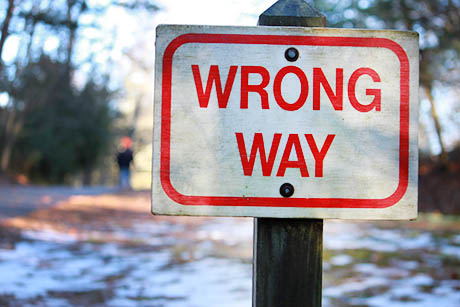Most people are afraid to turn around when they’ve made a choice they’ve determined to be wrong. If they turn the wrong way down a road — confidently declaring it to be the way to go — they persist with the error long after it’s obvious.
We humans hate admitting we’re wrong.
We trap ourselves with our desire to be consistent, even if we don’t consciously know what we’re doing. Most of us are terrified of being seen as contradictory, so we’re afraid to reverse course and say, “I know I said X, but I was wrong and I’ve realized Y is the truth.”
Most people keep themselves locked into X long after they’ve realized Y is true, because they’re too weak to admit to having been wrong and forthrightly turn around. This is what Ralph Waldo Emerson meant in a widely misunderstood passage in his 1841 essay on “Self-Reliance.”
“A foolish consistency is the hobgoblin of little minds, adored by little statesmen and philosophers and divines,” Emerson wrote. “With consistency a great soul has simply nothing to do. He may as well concern himself with his shadow on the wall. Speak what you think now in hard words and to-morrow speak what to-morrow thinks in hard words again, though it contradict every thing you said to-day.”
Emerson isn’t saying to be hypocritical. He isn’t saying to be intentionally confusing to people. He’s merely suggesting that you should speak truth as you understand it today — and also speak truth as you understand it tomorrow. If something about your understanding has changed, he says it is a “foolish consistency” to stick with what you had said before.
My life has been full of major changes. When I was young, I was a mainstream conservative. As I discovered the contradictions of my positions, I was forced into the libertarian camp. As I understood more and more about the principles in which I believed, I had to walk away from the entire political system — because my ethics insisted that nothing but a voluntary system could be moral.
I’ve radically changed my theological views. I’ve radically changed my ideas of what a good life is. I’ve radically changed my understanding of how to educate children and how to raise them in healthy ways. I’ve radically changed in my understanding of myself and what I’m trying to do with my life. Perhaps the most difficult reversal was walking away from a marriage that I had thought for years was close to perfect.
Every one of these changes required me to change my mind — then admit to others that I had been wrong — and then walk in a different direction. That isn’t easy.
We’ve been taught to be consistent. We’ve been taught to keep our word. We’ve been taught that it’s “waffling” to change our minds. What we haven’t been taught is how to say, “I was wrong,” and, “I’m going to correct this before the mistake goes any further.”
We all need to find what’s right for ourselves to do and be today and tomorrow and every day. If my conclusions about some things stay consistent — who I love, what my values are, where my ethical boundaries are — that’s great. But when I find I’ve been wrong about certain things, I have to turn around and admit my error.
A courageous and wise person admits he was wrong yesterday — or that something once true is no longer true — and changes course today.
If you’re sticking with something you said yesterday — merely because you said it yesterday — but you have now discovered the truth lies elsewhere, you owe it to yourself to say so. What’s more, your commitment ought to be to truth, not consistency with your own past errors.
If you’re driving down the wrong road of life — and it’s obvious you made a wrong turn — it’s time to turn around before things get worse. There’s nothing worse than the feeling inside of living a lie.

 Envy drives hatred for the wealthy, but I want to earn my way to riches
Envy drives hatred for the wealthy, but I want to earn my way to riches AUDIO: We lose the love we need by letting imperfections scare us
AUDIO: We lose the love we need by letting imperfections scare us I can force child to obey me, but obedience comes with high cost
I can force child to obey me, but obedience comes with high cost